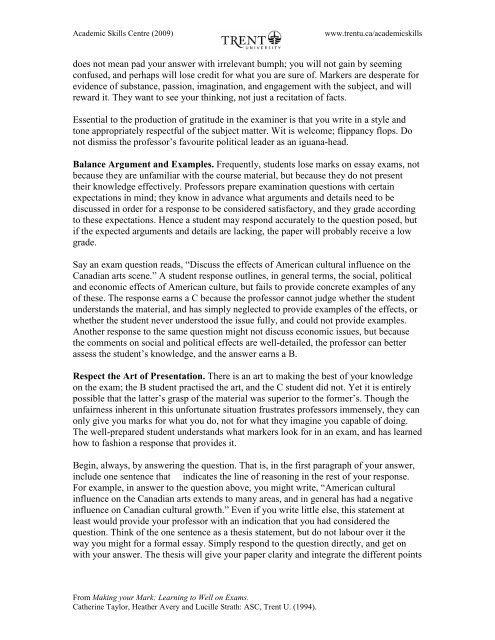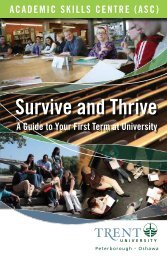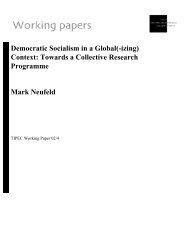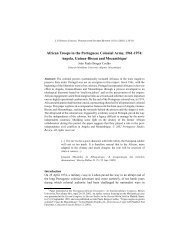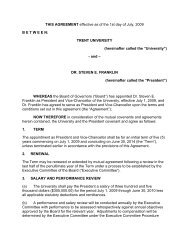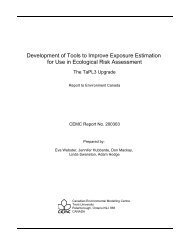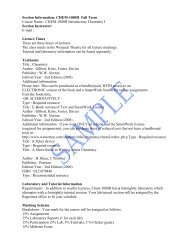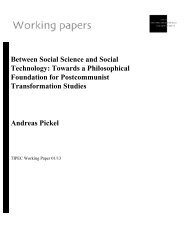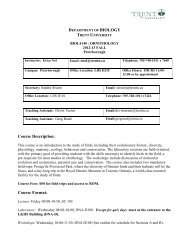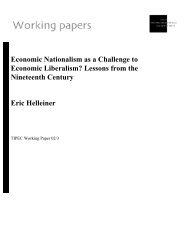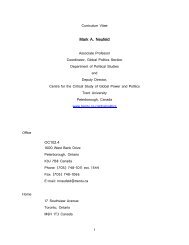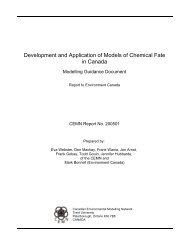Writing the essay question
Writing the essay question
Writing the essay question
You also want an ePaper? Increase the reach of your titles
YUMPU automatically turns print PDFs into web optimized ePapers that Google loves.
Academic Skills Centre (2009)<br />
www.trentu.ca/academicskills<br />
does not mean pad your answer with irrelevant bumph; you will not gain by seeming<br />
confused, and perhaps will lose credit for what you are sure of. Markers are desperate for<br />
evidence of substance, passion, imagination, and engagement with <strong>the</strong> subject, and will<br />
reward it. They want to see your thinking, not just a recitation of facts.<br />
Essential to <strong>the</strong> production of gratitude in <strong>the</strong> examiner is that you write in a style and<br />
tone appropriately respectful of <strong>the</strong> subject matter. Wit is welcome; flippancy flops. Do<br />
not dismiss <strong>the</strong> professor’s favourite political leader as an iguana-head.<br />
Balance Argument and Examples. Frequently, students lose marks on <strong>essay</strong> exams, not<br />
because <strong>the</strong>y are unfamiliar with <strong>the</strong> course material, but because <strong>the</strong>y do not present<br />
<strong>the</strong>ir knowledge effectively. Professors prepare examination <strong>question</strong>s with certain<br />
expectations in mind; <strong>the</strong>y know in advance what arguments and details need to be<br />
discussed in order for a response to be considered satisfactory, and <strong>the</strong>y grade according<br />
to <strong>the</strong>se expectations. Hence a student may respond accurately to <strong>the</strong> <strong>question</strong> posed, but<br />
if <strong>the</strong> expected arguments and details are lacking, <strong>the</strong> paper will probably receive a low<br />
grade.<br />
Say an exam <strong>question</strong> reads, “Discuss <strong>the</strong> effects of American cultural influence on <strong>the</strong><br />
Canadian arts scene.” A student response outlines, in general terms, <strong>the</strong> social, political<br />
and economic effects of American culture, but fails to provide concrete examples of any<br />
of <strong>the</strong>se. The response earns a C because <strong>the</strong> professor cannot judge whe<strong>the</strong>r <strong>the</strong> student<br />
understands <strong>the</strong> material, and has simply neglected to provide examples of <strong>the</strong> effects, or<br />
whe<strong>the</strong>r <strong>the</strong> student never understood <strong>the</strong> issue fully, and could not provide examples.<br />
Ano<strong>the</strong>r response to <strong>the</strong> same <strong>question</strong> might not discuss economic issues, but because<br />
<strong>the</strong> comments on social and political effects are well-detailed, <strong>the</strong> professor can better<br />
assess <strong>the</strong> student’s knowledge, and <strong>the</strong> answer earns a B.<br />
Respect <strong>the</strong> Art of Presentation. There is an art to making <strong>the</strong> best of your knowledge<br />
on <strong>the</strong> exam; <strong>the</strong> B student practised <strong>the</strong> art, and <strong>the</strong> C student did not. Yet it is entirely<br />
possible that <strong>the</strong> latter’s grasp of <strong>the</strong> material was superior to <strong>the</strong> former’s. Though <strong>the</strong><br />
unfairness inherent in this unfortunate situation frustrates professors immensely, <strong>the</strong>y can<br />
only give you marks for what you do, not for what <strong>the</strong>y imagine you capable of doing.<br />
The well-prepared student understands what markers look for in an exam, and has learned<br />
how to fashion a response that provides it.<br />
Begin, always, by answering <strong>the</strong> <strong>question</strong>. That is, in <strong>the</strong> first paragraph of your answer,<br />
include one sentence that indicates <strong>the</strong> line of reasoning in <strong>the</strong> rest of your response.<br />
For example, in answer to <strong>the</strong> <strong>question</strong> above, you might write, “American cultural<br />
influence on <strong>the</strong> Canadian arts extends to many areas, and in general has had a negative<br />
influence on Canadian cultural growth.” Even if you write little else, this statement at<br />
least would provide your professor with an indication that you had considered <strong>the</strong><br />
<strong>question</strong>. Think of <strong>the</strong> one sentence as a <strong>the</strong>sis statement, but do not labour over it <strong>the</strong><br />
way you might for a formal <strong>essay</strong>. Simply respond to <strong>the</strong> <strong>question</strong> directly, and get on<br />
with your answer. The <strong>the</strong>sis will give your paper clarity and integrate <strong>the</strong> different points<br />
From Making your Mark: Learning to Well on Exams.<br />
Ca<strong>the</strong>rine Taylor, Hea<strong>the</strong>r Avery and Lucille Strath: ASC, Trent U. (1994).


